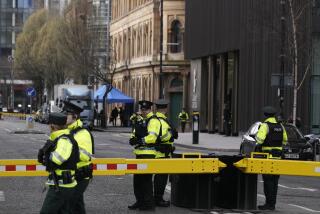Financier Desmond’s Vision for Ireland Far-Reaching : Sees His Country as the Jumping-Off Point to Unified Europe for Businesses in 1990s
- Share via
DUBLIN, Ireland — Some countries are blessed with oil, iron ore or even diamonds. But Ireland’s natural resources are its people and its educational system, says Dermot Desmond.
All right, the acknowledged Wunderkind of Irish finance will concede when pressed, that maybe its blarney should be mentioned, too.
But if blarney used to symbolize a sort of quiet, disarming native charm, the hyperactive, 38-year-old Desmond represents a new, concentrated brand for the hard-sell, fast-paced Europe of the 1990s.
Pointing to the unified European market planned for 1992, Desmond, the executive chairman of Dublin’s NCB Group Ltd., said: “We see a number of non-European companies that will want to market their financial services on the continent. Ireland should be the bridgehead for these companies.”
It was Desmond who first promoted the idea of transforming the seedy docklands section of Dublin into a new, international financial services center scheduled to open this fall. The 65 tenants already signed up include Irish and a range of foreign firms--from America’s Citicorp and Chase Manhattan Bank to Japan’s Daiwa Bank and West Germany’s Dresdener Bank.
Desmond’s influence extends well beyond that project, however: A few weeks ago, he became chairman of the newly created Irish Futures and Options Exchange.
While claiming no interest in politics himself, he has also been a key economic adviser to Irish Prime Minister Charles Haughey and his Fianna Fail (Soldiers of Destiny) political party during the country’s remarkable economic resurgence of the past two years.
In concert with two other center-right parties, Haughey has slashed government spending, cut foreign debt and brought a seemingly chronic double-digit inflation rate down to 3%.
“Desmond is credited with converting the Fianna Fail leadership, and Charlie Haughey specifically, after the (1987) election into taking this tougher economic line,” noted Terence J. Baker, senior research officer at Dublin’s Economic and Social Research Institute.
“He’s somebody who has the ear of the Taoiseach (prime minister). There’s no doubt about that,” confirmed a government official who spoke on condition of anonymity. And an Irish journalist said Desmond can occasionally be seen slipping into Haughey’s office around noon for a brown-bag lunch.
Interviewed in the offices of his stock brokerage and corporate finance firm in Dublin, Desmond would say of his relationship with Haughey only that “I’d be an admirer of him--of his national commitment. . . . We can have a kind of non-presidential communication.”
A smoker and fidgeter, Desmond has the appearance of a man in a hurry. When he was not talking during a recent interview, his foot bounced in time with some incessant inner tempo. Admirers describe him as “bright,” “lively,” even “charismatic.” Critics call him a self-promoter.
He founded National City Brokers as a foreign exchange and currency deposit agency in 1981 after several years of working first for Citibank in Dublin, then as a World Bank adviser to the government of Afghanistan in Kabul.
In 1984, his firm bought a small Dublin stock brokerage and became the NCB Group. The closely held company has since grown into one of the country’s largest stock, bond and corporate finance firms.
Married and the father of four, Desmond is acutely aware of the continuing emigration of Irish youth in search of the economic opportunities that this country has never seemed able to provide. His dream, he said, is “to see kids grow up in a country they’re proud of and which has opportunities for them to work in.”
The Europe of 1992 offers Ireland a unique chance, Desmond believes. With trading barriers scheduled to come down, the incentive is for firms to centralize their European operations, and Ireland has specific attractions for financial services companies, he said.
Desmond ticked off Dublin’s selling points: It is located within the same advantageous time zone as London, permitting communication with all the world’s major financial centers during waking hours. English is the language of finance, and Ireland’s highly regarded educational system is the source of a potentially superior work force.
Ireland has a new and efficient telecommunications system and, to sweeten the deal, the government has instituted what is reputed to be the most generous collection of tax breaks for foreign investors offered by any European Economic Community member.
On top of everything else, Desmond said, Dublin offers what some would consider a superior, less costly and certainly less congested life style than alternatives such as London.
With the first building in the new International Financial Services Center due to open in September, Desmond said there are as many more firms applying for licenses as have already signed up. The plan now calls for 500,000 square feet of space in the center, compared to the original 300,000, he added.
And if you think that’s blarney, Desmond said, you’re wrong. “All the blarney in the world won’t convince any of these financial firms to come in,” he explained. “The blarney we use is reinforcing the truth.”
More to Read
Sign up for Essential California
The most important California stories and recommendations in your inbox every morning.
You may occasionally receive promotional content from the Los Angeles Times.













